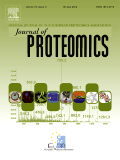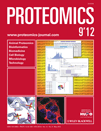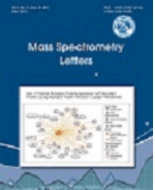
MOLECULAR & CELLULAR PROTEOMICS
metrics 2024
Connecting researchers with cutting-edge proteomic discoveries.
Introduction
MOLECULAR & CELLULAR PROTEOMICS, published by Elsevier, stands as a premier journal in the fields of Biochemistry, Analytical Chemistry, and Molecular Biology, with a distinguished Q1 ranking reflecting its high impact and contribution to the scientific community. Established in 2002, this journal has consistently provided a platform for the latest research in protein science, merging molecular biology with advanced analytical techniques. With impressive Scopus rankings—41st in Biochemistry and 16th in Analytical Chemistry—it caters to an audience of researchers, professionals, and students eager to explore cutting-edge developments in proteomics. Although currently not designated as open access, the journal aims to foster knowledge dissemination through accessible research content. As it continues to evolve until 2024, MOLECULAR & CELLULAR PROTEOMICS is essential for anyone passionately engaged in the ever-expanding field of proteomics.
Metrics 2024
 -
- 6.10
6.10 6.00
6.00 -
-Metrics History
Rank 2024
IF (Web Of Science)
JCI (Web Of Science)
Quartile History
Similar Journals

Molecular Systems Biology
Connecting Ideas, Inspiring DiscoveriesMolecular Systems Biology, published by SpringerNature, is a premier open access journal that has been a cornerstone in advancing the fields of biological science since its inception in 2005. With its ISSN 1744-4292, this journal exemplifies high scholarly standards, boasting an impressive suite of impact factors, including Q1 rankings across various disciplines such as Agricultural and Biological Sciences, Biochemistry, Genetics and Molecular Biology, and more, highlighting its significant contribution to the scientific community. The journal offers robust access options to facilitate innovative research dissemination, reaching a global audience while maintaining a commitment to fostering collaboration and dialogue among researchers, professionals, and students. With a focus on integrating quantitative approaches to biological systems, Molecular Systems Biology plays a vital role in addressing complex biological questions, paving the way for groundbreaking discoveries and advancements in healthcare, environmental sustainability, and functional genomics.

Clinical Proteomics
Connecting Research and Clinical Practice in ProteomicsClinical Proteomics is a leading open-access journal, published by BMC since 2011, that aims to advance the field of proteomics by providing a platform for the dissemination of original research, critical reviews, and technological advancements in the analysis of proteins and their roles in health and disease. With an ISSN of 1542-6416 and E-ISSN 1559-0275, this esteemed journal covers a broad scope, converging years of research from 2004 to 2024. As a distinguished publication, it holds a Q1 ranking in Clinical Biochemistry and Q2 in both Molecular Biology and Molecular Medicine, reflecting its significance in the scientific community. Clinical Proteomics' commitment to open access ensures that its content is readily available to researchers, professionals, and students worldwide, facilitating the exchange of knowledge and fostering collaborative efforts in proteomic studies. Situated in the United Kingdom, this journal plays a pivotal role in shaping the future of biomedical research, appealing to anyone keen on the integration of proteomics in clinical practice and molecular investigation.

Cancer Genomics & Proteomics
Unraveling the complexities of cancer at the molecular level.Cancer Genomics & Proteomics is a pivotal journal published by the International Institute of Anticancer Research, dedicated to advancing the fields of cancer genomics and proteomics. Established in 2004 and running until 2024, this journal provides a vital platform for the dissemination of high-quality research that explores genetic and protein interactions in cancer, thereby fostering innovations in diagnostics and therapeutics. The journal boasts a commendable Q2 ranking in Biochemistry and Genetics and is recognized in the Q3 tier for its contributions to Cancer Research and Molecular Biology, reflecting its growing impact in these dynamic fields. Operating out of Greece, it engages a diverse audience, including researchers, clinicians, and students, by sharing significant findings and methodological advancements in the realm of cancer studies. While currently not an open-access publication, Cancer Genomics & Proteomics remains committed to enriching scientific dialogue and collaboration with its insightful articles and reviews.

Journal of Proteomics
Unlocking the secrets of protein interactions.Journal of Proteomics, published by Elsevier, is an esteemed peer-reviewed journal dedicated to advancing research in the field of proteomics, with broad implications for biochemistry and biophysics. Established in 2008, the journal has continuously evolved, embracing innovative methodologies and technologies that facilitate protein analysis from a variety of biological systems. With its current standing in the Q2 category for both biochemistry and biophysics as of 2023, it is recognized as a significant contributor to scientific literature. The journal publishes original research articles, reviews, and methodological advancements, providing invaluable insights for researchers, professionals, and students alike. Although it does not offer open access, the journal remains a crucial platform for disseminating knowledge that informs various applications, ranging from drug development to disease understanding. As it converges towards 2024, the Journal of Proteomics continues to solidify its role in shaping the future of proteomic research through rigorous scientific inquiry and innovation.

Genome Medicine
Catalyzing Discoveries in Molecular MedicineGenome Medicine is a prestigious, peer-reviewed journal published by BMC, focusing on the rapidly evolving fields of genetics, molecular biology, and molecular medicine. Established in 2009 and boasting an open-access format, it has become a leading platform for disseminating high-quality research findings that advance our understanding of genetic diseases and therapeutic innovations. With an impressive Q1 ranking across multiple relevant categories—in particular, genetics (clinical), molecular biology, and molecular medicine—this journal is recognized for its substantial impact in the academic community, as evidenced by its exceptional placement in Scopus rankings. By providing unrestricted access to groundbreaking studies, Genome Medicine fosters collaboration and knowledge sharing among researchers, clinicians, and educators, thus playing a vital role in the transition from fundamental genetic research to clinical applications. Researchers are encouraged to contribute their findings and insights, further solidifying the journal’s position as a pivotal resource for those dedicated to advancing genomic medicine.

BIOCHIMICA ET BIOPHYSICA ACTA-MOLECULAR BASIS OF DISEASE
Decoding Disease at the Molecular LevelBIOCHIMICA ET BIOPHYSICA ACTA-MOLECULAR BASIS OF DISEASE, published by Elsevier, is a pivotal journal in the fields of Molecular Biology and Molecular Medicine, recognized for its high impact factor and robust ranking within Scopus categories, holding prestigious quartiles in Q1 for both disciplines as of 2023. With ISSN 0925-4439 and E-ISSN 1879-260X, this journal fosters cutting-edge research from 1990 to 2025, addressing the critical molecular mechanisms underlying human diseases. Its wide-ranging scope includes original research articles, reviews, and advanced theoretical insights, serving as an essential resource for researchers, clinicians, and students alike. The journal is based in the Netherlands, at RADARWEG 29, 1043 NX AMSTERDAM, and while it does not currently offer an open-access option, it continues to maintain a strong presence in the scientific community, enhancing our understanding of molecular processes in health and disease.

Cell Chemical Biology
Bridging Disciplines to Transform Life Sciences.Cell Chemical Biology, published by Cell Press, stands at the forefront of interdisciplinary research in the realms of biochemistry, molecular biology, and pharmacology. With a robust impact factor evident in its prestigious Q1 quartile rankings across multiple categories including Clinical Biochemistry and Drug Discovery for 2023, this journal serves as a critical platform for disseminating cutting-edge scientific discoveries. As an Open Access publication, it ensures that vital research is accessible to a wide audience, fostering collaborations and driving innovation in the life sciences. Based in the United States, and featuring publications from 2016 to 2024, Cell Chemical Biology invites researchers, professionals, and students alike to contribute to its mission of advancing knowledge through rigorous peer-reviewed articles that address both fundamental and applied aspects of chemical biology.

PROTEOMICS
Pioneering discoveries in protein function and interaction.PROTEOMICS is a leading journal focused on the rapidly evolving field of proteomics, published by WILEY in Germany. With a solid reputation established since its inception in 2001, it has continually contributed to the understanding of protein functions and interactions within biological systems. As part of its commitment to academic excellence, PROTEOMICS is ranked in the second quartile for both Biochemistry and Molecular Biology categories (2023), reflecting its significant influence in advancing research in these areas. Although it does not currently provide open access options, it remains a vital resource for researchers, professionals, and students keen to explore innovative methodologies and findings in proteomic research. By publishing groundbreaking studies that bridge theoretical knowledge with practical applications, PROTEOMICS plays a crucial role in enhancing our understanding of molecular processes and driving forward advancements in the life sciences.

ACS Chemical Biology
Illuminating the Pathways of Biochemical ResearchACS Chemical Biology is a premier journal published by the American Chemical Society, dedicated to advancing the understanding of the chemical underpinnings of biological systems. With an ISSN of 1554-8929 and a distinguished track record since its inception in 2006, this journal provides a vital platform for the dissemination of high-quality research in the realms of biochemistry and molecular medicine, achieving a prestigious Q1 ranking in these categories as of 2023. In an era where interdisciplinary approaches are crucial, ACS Chemical Biology fosters collaboration among chemists and biologists, reflecting a steadfast commitment to exploring the chemical processes that govern life. Although it does not operate under an open-access model, the journal maintains a rigorous peer-review process, ensuring the publication of influential studies that shape the future of chemical biology. With an increasing impact factor and a focus on innovative research, ACS Chemical Biology remains an authoritative resource for researchers, professionals, and students eager to engage with cutting-edge findings in this dynamic field.

Mass Spectrometry Letters
Connecting Ideas, Catalyzing Collaborations in Mass Spectrometry.Mass Spectrometry Letters is a pioneering open-access journal published by the Korean Society for Mass Spectrometry, specializing in the diverse fields of analytical chemistry, biochemistry, and spectroscopy. Established in 2010, this journal aims to disseminate groundbreaking research and advancements in mass spectrometry and its applications across various scientific domains. Though currently categorized in the Q4 quartile in key analytical fields, Mass Spectrometry Letters serves as an essential platform for researchers, professionals, and students to share innovative methodologies, emerging trends, and practical applications of mass spectrometry, thus fostering collaboration and advancing knowledge in the scientific community. With a commitment to open access, articles published since 2010 are readily available, enabling widespread distribution and engagement within the international research community. Located in Daejeon, South Korea, and actively converging research through 2024, the journal holds the potential to grow its impact and relevance within the dynamic landscape of mass spectrometry.